Know Your Lore: The forgotten kingdom of Alterac
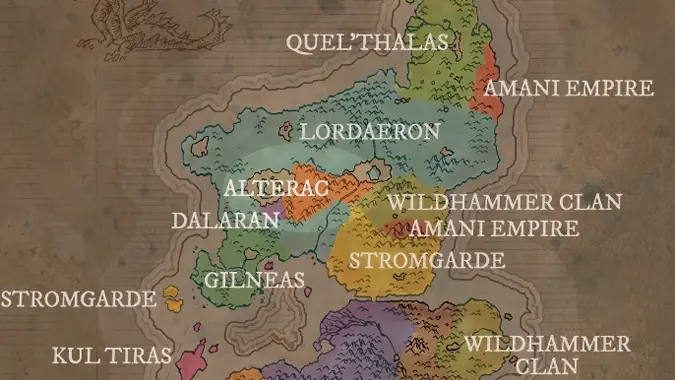
Perhaps it never should have been a kingdom at all. These days, the only time anyone hears the word Alterac is in reference to a snowy valley, rich with resources and the sounds of constant combat. What nobody mentions — and what is rarely seen — is that Alterac was once one of the seven kingdoms that originally formed the Alliance of Lordaeron. The ruins in Alterac Mountains were once its capital city. Little is said of its fate. In fact, little is said about it at all.
But perhaps that’s only appropriate, given its history. For while the other seven kingdoms either thrived or faded in glorious or tragic circumstance, Alterac’s story is far less noble — and its fate, just deserved.
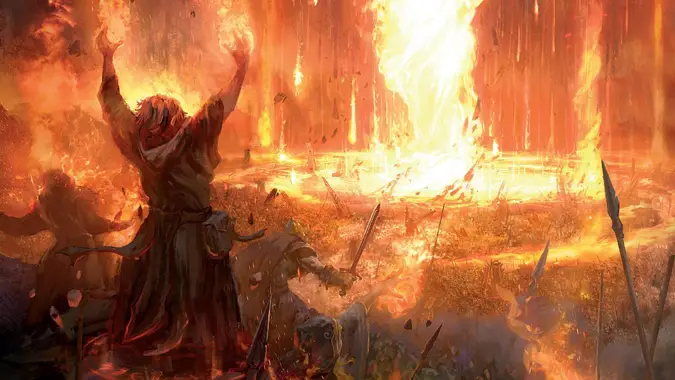
Troll Wars
Long ago, there was only one Human nation — Arathor. Its capital was Strom, way down in the Arathi Highlands. When Arathor allied with the High Elves of Quel’Thalas during the Troll Wars, the Arathi army moved northward. In the lower slopes of the Alterac Mountains, they built Alterac Fortress. It was intended to act as a staging ground for the Arathi army during the war. The alliance with Quel’Thalas included a deal — the High Elves would teach one hundred humans the ways of arcane magic. In return, Arathor would assist Quel’Thalas against the Amani Trolls.
Alterac Fortress was where those one hundred newly trained Mages stayed put. Meanwhile, Trollbane staged a direct attack against the Amani. But it was all a ploy — his armies attacked and then quickly began to beat a retreat. The Amani followed, hounding the Arathi army all the way back to Alterac Fortress…and that’s when the Mages struck. Together with the High Elves, the Human Mages called down a firestorm that incinerated thousands of Amani soldiers, as well as their leader, the warlord Jintha. Without their leader, the Amani Empire crumbled, signaling the end of the Troll Wars.
Following the end of the conflict, the Human Mages eventually left Strom altogether. They founded their own nation, calling it Dalaran. It was the first of many city-states founded as Arathor began to wane. Others began exploring as well, and settled other areas. Some Human settlers ended up in the area where Alterac Fortress stood. Eventually, they founded the city-state of Alterac. Over time, all that was left of Arathor was Strom. It was renamed Stromgarde, and it became its own kingdom in turn.
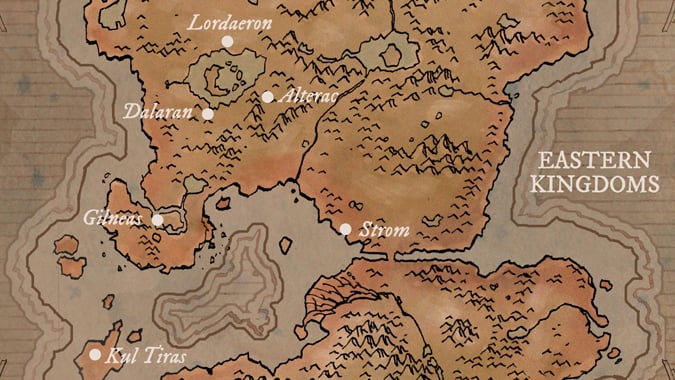
Alterac
Alterac didn’t really become a city-state so much as it stumbled into it. Its position in the Alterac Mountains placed it smack in the middle of several important trade routes. This led to its growing importance over time. Initially, Alterac was still completely loyal to Strom. But as time passed, Strom’s leadership eventually surrendered its authority over the assorted city-states. Alterac never made any kind of formal decree for independence. It was simply something that happened over the course of time.
Over the years, the seven Human kingdoms dealt largely with the game of politics, sometimes working together, other times…not so much. Prior to the Second War, Alterac had established a fairly healthy rivalry with Stromgarde. More than once, King Thoras Trollbane led Stromgarde’s armies against Alterac’s. Alterac always managed to hold its position as a legitimate Human kingdom. But that didn’t stop Alterac’s leaders from growing increasingly bitter toward Stromgarde, as well as the kingdoms that chose to call Stromgarde an ally.
At the start of the Second War, Alterac was led by King Aiden Perenolde. Perenolde was quiet, calculating, and keenly aware that his kingdom was neither the strongest nor the largest of the seven. When news of the Orcish Horde reached Alterac, he was rightly concerned about what it meant for his kingdom. Reluctant to engage in a fight he could not possibly hope to win, King Perenolde initially didn’t want to join the Alliance of Lordaeron. But when all the other Human kingdoms eventually joined, he signed Alterac up as well.
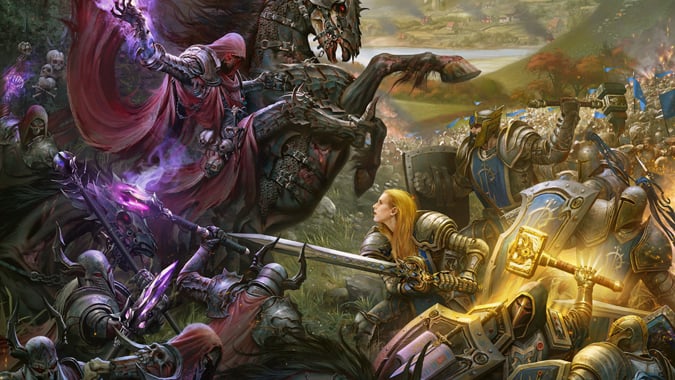
Traitor
At the onset of the Second War, the Horde presented a massive threat. Stormwind was utterly destroyed by the Horde at the end of the First War. All in all, the situation was looking pretty grim for the Alliance of Lordaeron. Perenolde saw this, and was terrified at what an Alliance failure would mean for his kingdom, small as it might be. So he made a fateful choice — he chose to collaborate with the Horde.
It started out small — just information freely given in exchange for the safety of his kingdom. But it slowly progressed to larger misdeeds. He arranged strategic ambushes, attempted assassinations, and fomented revolts. Perenolde even let the Horde travel through Alterac unimpeded. He ordered his military leaders to distant garrisons, and let the Horde take the southern routes.
Eventually, Perenolde’s treachery caught up with him. Alterac soldiers were caught fighting for the Orcs, instead of against them. Stromgarde was quick to act, Trollbane leading his forces to the kingdom. He placed Perenolde under house arrest, and established martial law. As the sovereign king, Perenolde couldn’t be exiled, executed, or imprisoned. The other kings demanded he abdicate, but Perenolde refused. Doing so would only sign his death warrant. Alterac still stood…but it was largely in disgrace.
Perenolde only continued to add to it. After the Alliance won the Second War, Perenolde arranged for his troops to steal the Book of Medivh. He hoped to use it for future leverage. As luck would have it, the Horde wanted the book — and he wanted Stromgarde out of his kingdom. The trade was made, and Deathwing arrived to attack Stromgarde’s barracks. It was enough to tip the scales for Perenolde. Officially declared a traitor, he fled, a warrant placed on his head. Alterac’s loyal nobles were exiled in disgrace.
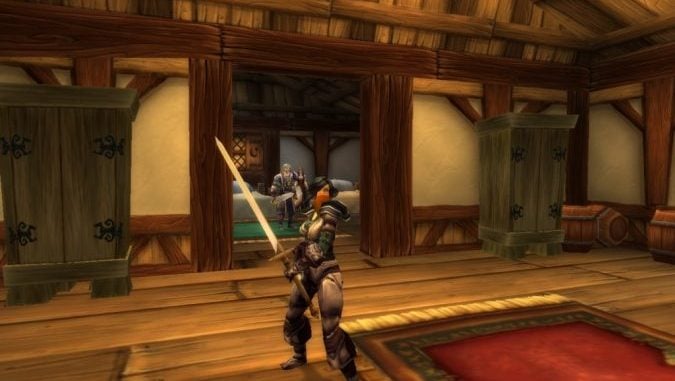
Ruins of Alterac
Alterac never had another leader. Oh, the Alliance searched for one — they considered Perenolde’s son, Aliden, and his nephew Isiden as well. They even considered handing the lands over to one Lord Prestor. Although a stranger, he managed to sway the assorted Alliance leaders to his favor. Little did they know that Prestor was actually Deathwing in Human guise. The plan fell through when Prestor mysteriously disappeared — or rather, when Deathwing was defeated at Grim Batol.
Alterac’s nobles, on the other hand, lived on…as did Perenolde. No longer king, but desperate to reclaim his kingdom, he gathered the nobles to his side. When Lordaeron crumbled during the Third War, Perenolde took the opportunity to reclaim his lands. This time, he didn’t try to work with the enemy. He simply organized his own raiding parties with the former nobles of Alterac. They met with little resistance — Lordaeron’s citizens were already terrified and confused with the onset of the Scourge and the Burning Legion.
Perenolde was no longer king — and his followers, no longer nobility. Incensed at both Alliance and Horde in kind, he formed the Syndicate. A criminal collective, the Syndicate was intent on taking back the land the Alliance had stolen. In addition, they wanted revenge on Stromgarde. In the wake of the chaos left over after the Third War, the Syndicate managed to lay claim to a fairly sizable chunk of Lordaeron. But Perenolde wouldn’t see the Syndicate to its fruition — eventually, he was captured. The former king of Alterac spent his remaining days rotting away in prison, his son Aliden taking over the Syndicate in his place.
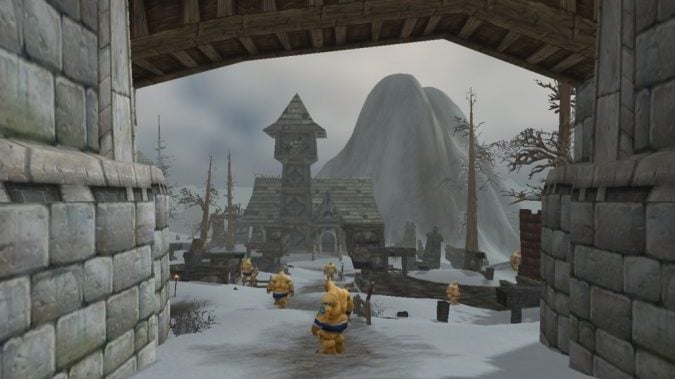
Bitter remains
And Alterac was left to rot away as well. These days, there’s nothing left of the kingdom’s capital but a set of Ogre-infested ruins. Few speak of the fallen kingdom. Those who do have little good to say about it. Little remains of the Syndicate, just a few small outposts in Arathi and Alterac. They hold no power — with the rise of Forsaken activity in Cataclysm, there’s little worth holding. Aliden Perenolde is dead. His successor, Lord Falconcrest, is presumed dead as well.
Alterac was never a great nation. It didn’t have the industrial advancement of Gilneas, or the maritime prowess of Kul Tiras. It lacked the dazzling spellcasters and wisdom of Dalaran, the military might of Stromgarde. And it had none of the size, stature, or honor of Stormwind or Lordaeron. All it had, in the end, was a cowardly leader and a population of traitors. So perhaps it’s only fitting that Alterac’s most notable accomplishment was in the years before its formation — when a steadfast band of one hundred Human Mages turned the fires of the heavens on a legion of thousands, and brought the Amani Empire to its knees.
Please consider supporting our Patreon!
Join the Discussion
Blizzard Watch is a safe space for all readers. By leaving comments on this site you agree to follow our commenting and community guidelines.
 @Shadesogrey
@Shadesogrey




